
Бесплатный фрагмент - Tommy’s house
CHAPTER 1
Tommy
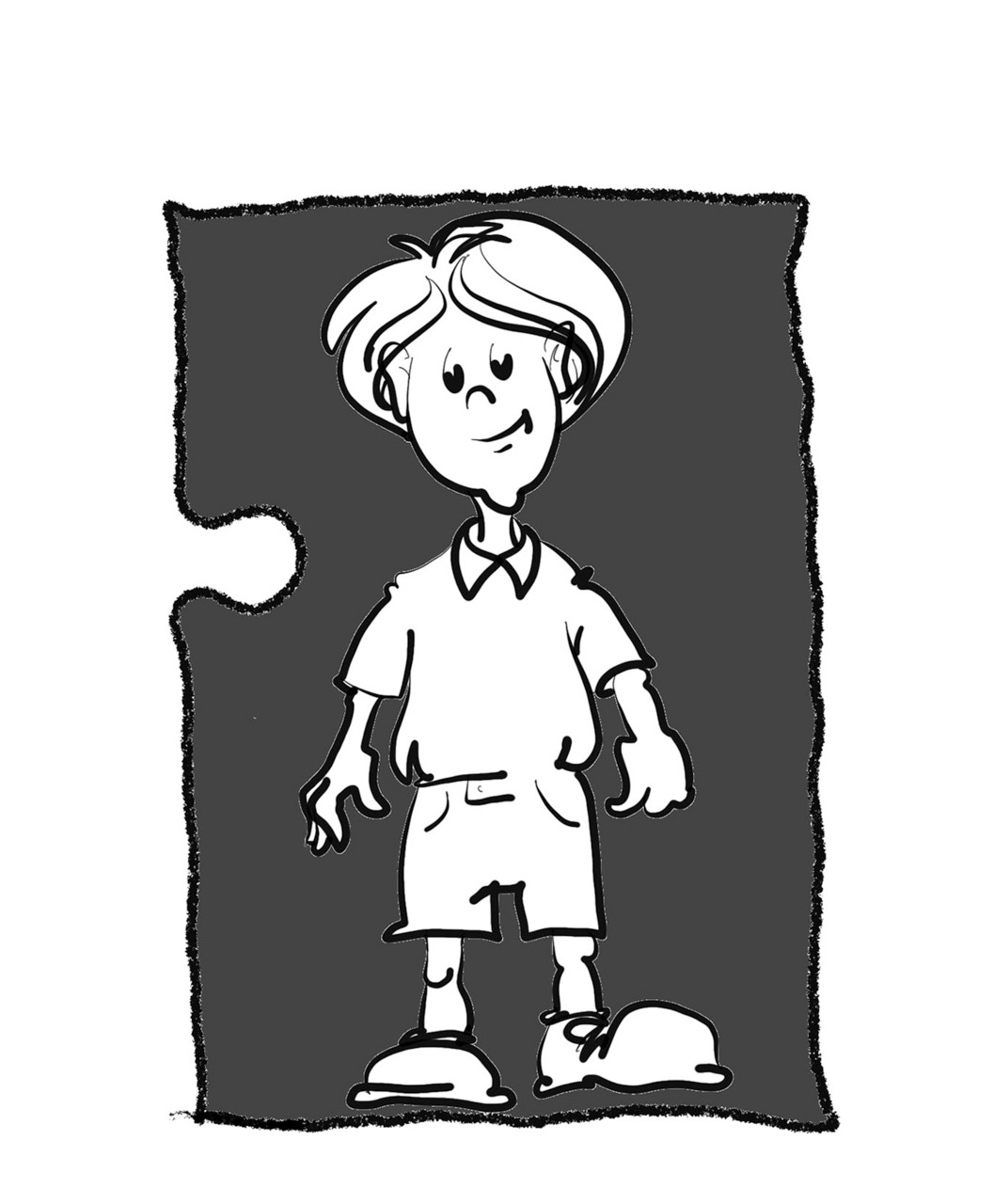
There was a big house in the dense forest between high malachite mountains.
Braided with green ivy, hidden in the heart of the dark wood, it looked mysterious and lonely. Actually, when you approached it, you could see that it was cosy, warm and friendly. The dwelling with its large windows, dark green door and tiled roof resembled a marvellous house in a fairyland.
A little boy Tommy and his family lived in this house. He was a smart child of eight, looking funny with freckles and a snub nose on his round face. His brown hair was slightly curly. The boy looked at the world with bright green eyes and a timid smile.
Tommy could be different almost every day. He was fickle like a leaf in the wind. His mood changed according to the situation. His behaviour varied depending on the expectations of his parents. Sometimes the kid was cheerful and talkative, but pretty soon he became reserved and shy. One day he could be generous and responsive, but the next day he didn’t want to speak and share anything with anyone.
For a boy of his age Tom was very observant, witty, and quite self-centred like most children.
Tommy’s parents took care of him, and of course, they loved their son, but they were too busy at work. That is why he often spent time alone, though he didn’t feel sad or lonely. Tommy wandered about the house, travelling from one room to another. He always found some interesting activities there. Each room had something special for him.
HELPFUL WORDS AND NOTES
malachite [mæləkaıt] — малахитовый
braided with ivy [breıdıd] [wɪð] [aıvı] — оплетённый плющом
dwelling [dwelıŋ] — дом, жилище
tiled roof [taıld] [ru f] — черепичная крыша
to resemble [rızembl] — походить на
кого-либо, напоминать
fairyland [feərɪlænd] — сказочная
страна
freckles [freklz] — веснушки
timid smile [tɪmɪd] [smaɪl] — робкая,
застенчивая улыбка
fickle [fɪkl] — переменчивый,
непостоянный
according to smth [əkɔ dɪŋ] [tu] —
в зависимости от чего-либо
talkative [tɔ kətɪv] — разговорчивый,
словоохотливый
reserved [rɪzɜ vd] — сдержанный,
замкнутый
responsive [rɪspɔn(t)sɪv] — отзывчивый, чуткий
observant [əbzɜv(ə)nt] — наблюдательный, внимательный
witty [wɪtɪ] — остроумный
self-centred [_selfsentəd] — эгоцентричный, эгоистичный
to wander [wɔndə] — прогуливаться, бродить
VOCABULARY AND GRAMMAR TASKS
I Match the words that go together.
A smart 1. smile
B malachite ⠀ ⠀ ⠀ ⠀ 2. roof
С slightly ⠀ ⠀ ⠀ ⠀ ⠀ ⠀ 3. forest
D dark ⠀ ⠀ ⠀ ⠀ ⠀ ⠀ ⠀ 4. nose
E timid ⠀ ⠀ ⠀ ⠀ ⠀ ⠀ 5. child
F dense ⠀ ⠀ ⠀ ⠀ ⠀ 6. face
G tiled ⠀ ⠀ ⠀ ⠀ ⠀ ⠀ 7. curly
H round ⠀ ⠀ ⠀ ⠀ ⠀ ⠀ 8. mountains
I large ⠀ ⠀ ⠀ ⠀ ⠀ 9. eyes
J snub ⠀ ⠀ ⠀ ⠀ ⠀ 10. wood
K bright ⠀ ⠀ ⠀ ⠀ ⠀ 11. window
II Here are several words and expressions from the text (A — I). Match the definition of each of them from the list below (1 — 9).
A timid
B talkative
C self-centred
D fairyland
E freckles
F reserved
G witty
H responsive
I observant
1. only concerned with their own wants and needs and never thinks about other people
2. showing a lack of courage or confidence; easily frightened
3. fond of talking
4. someone who keeps their feelings hidden
5. responding readily and with interest or enthusiasm
6. an imagined ideal place
7. someone who pays a lot of attention to things and notices more about them than most people do
8. showing or characterised by quick and inventive verbal humour
9. small patches of light brown colour on the skin, often becoming more pronounced through exposure to the sun
III Make up sentences of your own with the word combinations from exercises I and II.
IV Translate the sentences using the vocabulary of chapter 1.
1. Его тётя была отзывчивой и щедрой. Она напоминала добрую волшебницу из сказки.
2. Голос мамы менялся в зависимости от её переменчивого настроения.
3. Мальчик бродил по густому лесу и увидел старый дом, оплетённый плющом.
4. Внешний облик девушки с курносым носом, слегка вьющимися светлыми волосами и застенчивой улыбкой производил на всех обманчивое впечатление.
5. По словам её брата, она вовсе не была застенчивой и замкнутой.
6. Его болтливая сестра делилась своими секретами со всеми.
7. Ты заметила того эгоцентричного парня вчера на вечеринке? На самом деле он очень внимательный и остроумный.
DISCUSSION TASKS
I Answer the following questions.
1. Where was the house situated?
2. What did the dwelling resemble?
3. How old was Tommy?
4. Who did he live in the house with?
5. What influenced his mood and behaviour?
6. Did he have a good sense of humour?
7. Did Tommy’s parents spend much time with him?
8. Why was Tommy often alone?
9. Did the boy feel lonely when he stayed alone?
10. What did he do in the house?
II Complete the following tasks:
1. Describe Tommy’s house.
2. Describe Tommy. Tell about his character.
3. Tell about Tommy’s attitude to the house.
TALKING POINTS
I Describe your place (a flat, a house).
II Tell about your dream home.
CHAPTER 2
Lilly
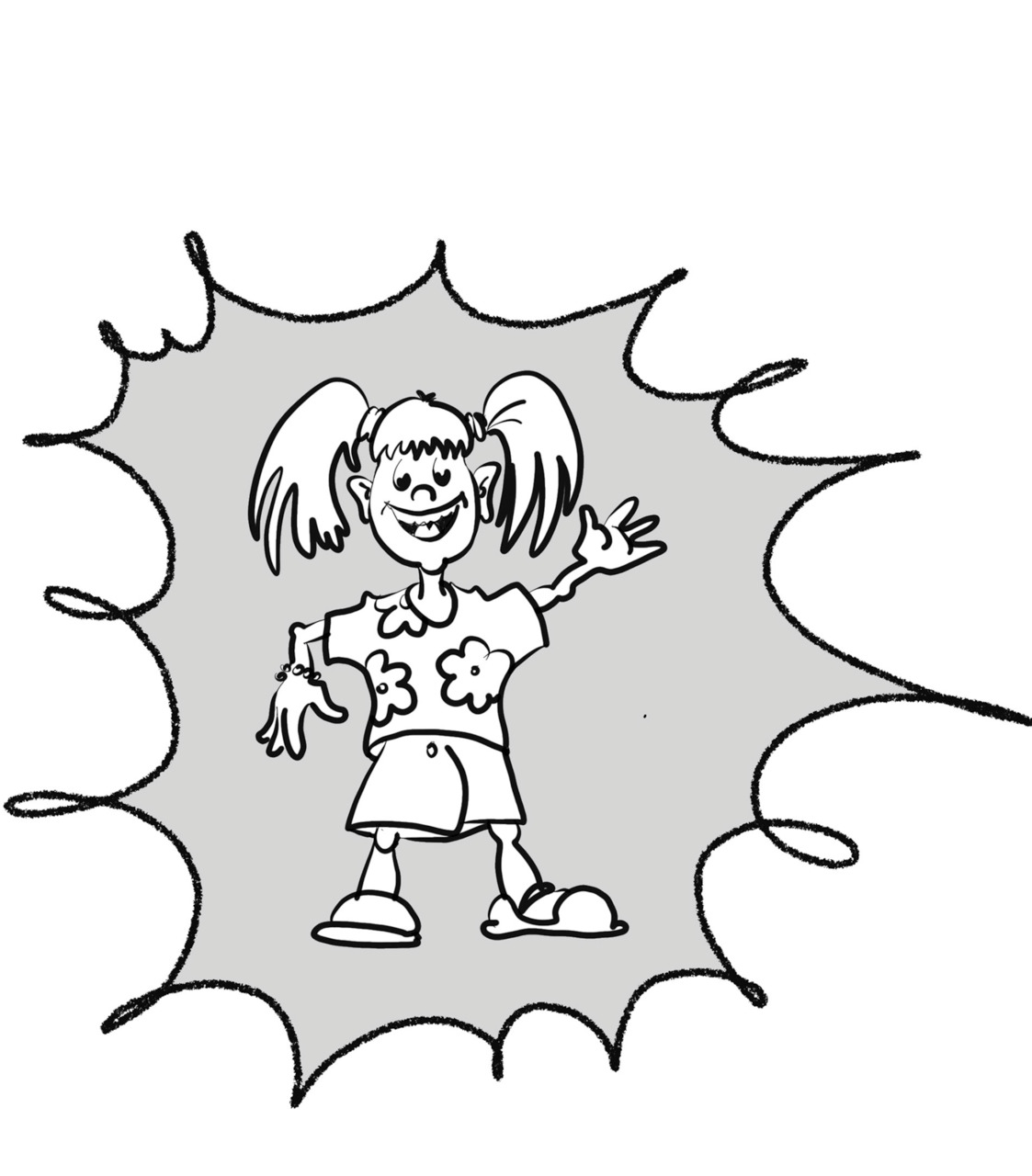
Lilly was Tommy’s younger cousin. She was almost five. The little girl with pure freedom in her magnificent black eyes and fair tresses visited the house with her mum occasionally.
Lilly asked too many questions with her squeaky voice and made much noise. It irritated Tommy. Dressed in a short yellow skirt and a green t-shirt with flower print, she could whirl in front of the mirror and sing a child’s song.
She had a handmade date bones bracelet on her right wrist. The girl said that it was her talisman. She was in the habit of touching and twisting the glossy brown bones with her tiny fingers. Lilly never took it off and allowed nobody to touch it.
The little girl attracted all parents’ attention and admiring glances, though the boy considered her to be a spoilt, capricious child. When he refused to play with her or to give the little girl some toys, parents often scolded Tommy for his behaviour.
Lilly was a really lively child. Everything in the world aroused her keen interest. She was open to any activity and capable of vivid communication with everyone.
“Tommy, what is your favourite book?”
“I like all books.”
“Well, don’t you have a special book that you would read again and again?!”
“No, I don’t.”
“Tommy, what season do you like most of all?”
“I like winter, though all seasons are good enough.”
“Oh, Don’t you like swimming in the lake and admiring the flowers in your garden in summer?!”
“I do.”
“Tommy, where would you like to travel?”
“The whole world.”
“And what is the place of your dream?”
“There are a lot of them on the planet.”
“Tommy…”
“I have to go.”
Three Lilly’s questions were the little man’s limit of patience. He got tired of her activity very quickly. Usually Tom tried to avoid speaking to the girl. Her emotional reactions made him nervous. The girl could tell him some amusing stories, gushing with admiration, but he stayed aloof. She shared her profound impressions with him, but it didn’t touch him, he just didn’t care. For this reason he hardly ever spent time with her. He often slipped away and hid in one of the rooms when she stayed at the house.
HELPFUL WORDS AND NOTES
squeaky voice [skwi_kɪ] [vɔɪs] — писклявый, визгливый голос
to irritate [ɪrɪteɪt] — раздражать, надоедать
to be in the habit of doing smth [bi] [ɪn] [ðə] [hæbɪt] [əv] [duɪŋ] — иметь привычку делать что-либо
glossy [glɔsɪ] — глянцевый, гладкий
to consider smb to be [kənsɪdə] [tə] [bi] — считать кого-либо кем-либо, каким-либо
spoilt child [spɔɪlt] [ʧaɪld] — избалованный ребёнок
to scold [skəuld] — ругать (ся), ворчать
lively [laɪvlɪ] — живой, активный,
весёлый
to arouse keen interest [ərauz] [ki n] [ɪnt(ə)rəst] — вызывать большой интерес
to be capable of smth [bi] [keɪpəbl] [əv] — быть способным на что-либо
limit of patience [lɪmɪt] [əv] [peɪʃ(ə)n(t)s] — предел терпения
to gush with admiration [gʌʃ] [wɪð] [_ædməreɪʃ(ə)n] — захлёбываться от восторга
aloof [əlu f] — равнодушный,
отчуждённый
profound impression [prəfaund] [ɪmpreʃ(ə)n] — глубокое, сильное впечатление
to touch [tʌʧ] — трогать, задевать за живое, волновать
VOCABULARY AND GRAMMAR TASKS
I Fill in the gaps with the words and phrases from the list below in the appropriate form.
squeaky voice; spoilt child; to gush with admiration; to irritate; to touch; to scold lively; to consider; to be limit of patience;
aloof
1. Don’t ______________ your small cousin for her wild behaviour. Try to talk to the girl and explain everything to her.
2. She often __________________________even when she sees something ordinary.
3. His sister ________________ me, especially when she pronounces words with her high _____________________.
4. The governess tries to teach manners and to bring up that _________________.
5. That boy looks remote, he ________________________ cold and tough.
6. Actually, he is not so ________________, he can be really _____________ when somebody or something __________________ the strings of his soul.
7. Lady Canterville was stressed to _____________________________when she saw a ghost in the castle again.
II Complete the following sentences:
1. I am in the habit of _______________.
2. I am capable of _______________.
3. I am not capable of _______________.
4. It made a profound impression on me when _______________.
5. It arouses my keen interest when _______________.
6. I hardly ever _______________.
III Open the brackets using the verbs in Present Simple or Past Simple.
1. This curious girl usually (ask) a lot of questions about everything she (see) in the museum.
2. Lilly (lose) her gorgeous talisman somewhere in the house yesterday.
3. Where you (hide) the bracelet?
4. What song his cousin often (sing) when she whirls in front of the mirror?
5. This serious boy usually (not find) exciting the stories his little sister (tell) him.
6. Professor Whitehouse (say) that he (know) several scientists who (make) that experiment a long time ago.
7. The girl’s mother (call) the teacher every day and (ask) about her daughter’s progress.
8. Why the student (show) his essay to the rest of the group?
9. Doctor Sam regularly (give) new prescriptions to Granny.
10. Tommy hardly ever (speak) to his capricious cousin.
DISCUSSION TASKS
I Describe Lilly. Tell about her nature.
II Answer the following questions.
1. What was Tommy’s attitude to Lilly?
2. What was the parents’ attitude to Lilly?
3. What did parents often scold Tommy for?
4. What did Lilly wear on her right wrist?
5. Did Tommy and Lilly have much in common?
6. How did Tommy behave when Lilly asked him questions?
7. What was Tommy’s usual reaction to Lilly’s stories?
8. What did Tommy do when his cousin stayed at his house?
9. Why did he avoid Lilly?
10. What Lilly’s character traits were unlike Tommy’s features?
TALKING POINTS
I Describe the appearance of your sister/brother/cousin/friend.
II Tell about his/her temper, habits, special features.
III Tell about the place where he/she lives.
IV Answer the following questions.
1. What do you have in common with your sister/brother/cousin/friend?
2. What are you different in?
3. Do you get on well with him/her?
4. What do you like about this person?
5. What do you not like about him/her? Why?
CHAPTER 3
The Kitchen
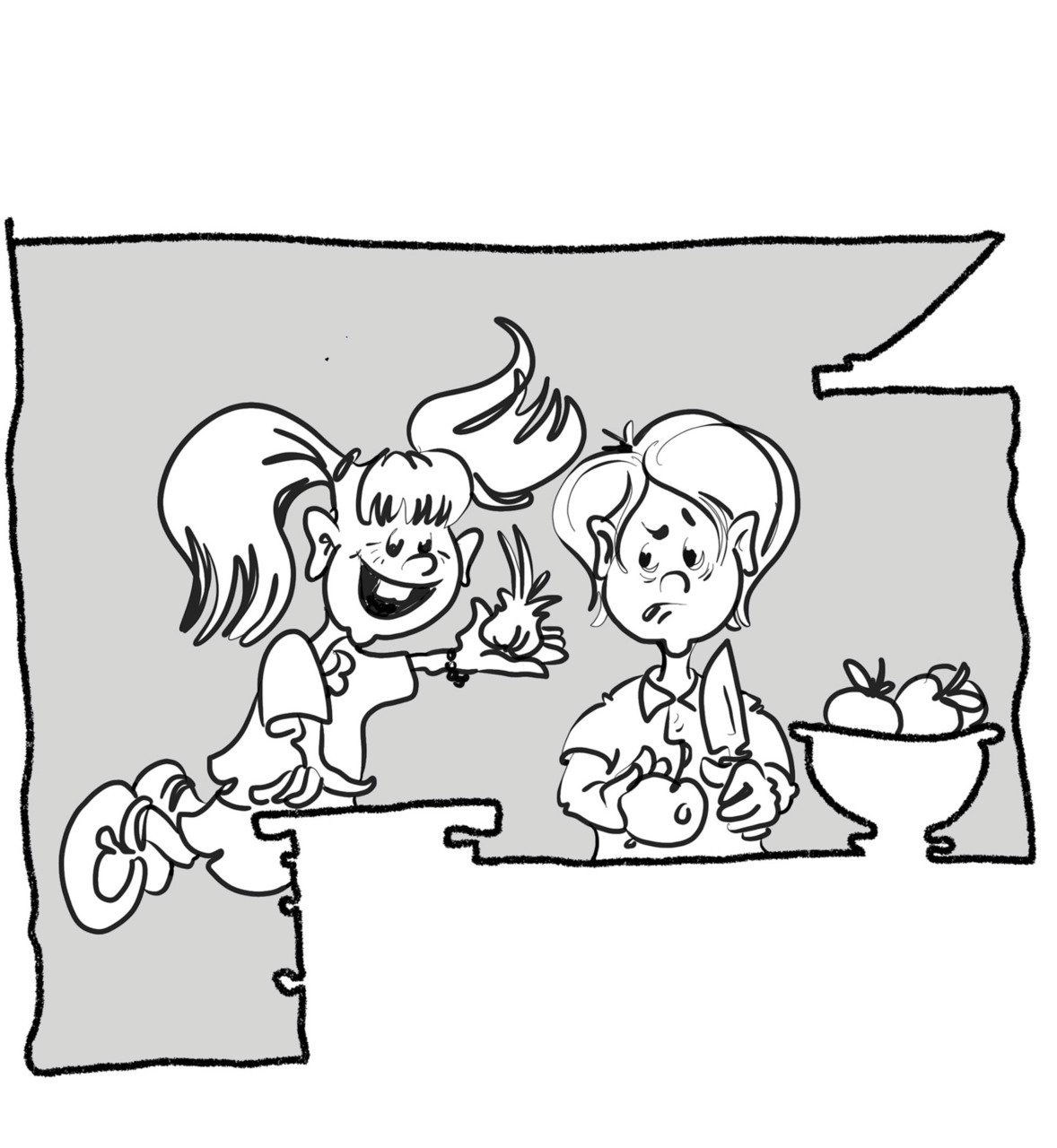
Every morning Tommy ran to the kitchen.
He liked eating scrambled eggs with a slice of ham and a toast with cheese and having a big cup of mint tea for breakfast. Sometimes he had a plate of porridge, but it was his least favourite dish. Pancakes with honey or cranberry jam Tommy preferred to cornflakes with milk. He adored eating them, it was his best breakfast.
When his granny Kate, who lived not far from his place, visited the house, she made a real feast. She started cooking the most delicious things in the world: grilled meat or fish with herbs, spices and vegetables, baked mushrooms, wonderful pumpkin or cherry pie. The kitchen was filled with tasty flavours and warmth.
She often allowed Tommy to help her and gave him some errands. In spite of Granny’s control, the boy could find a piece of freedom at those moments. He was glad to learn how to slice tomatoes, cucumbers, peppers, to peel potatoes and carrots. He grated cheese and garlic, listening to granny’s wise advice. With great pleasure and care the kid blended different ingredients of granny’s special dough for biscuits. Then Tommy decorated them with flavorous plum jam.
When Lilly unexpectedly entered the kitchen, Tommy wasn’t glad to see her. She was constantly breaking the order. He knew her habit of tasting almost all products that she could see on the table or in the fridge.
“Oh, it is so sweet! Wow! The cookies smell vanilla! Ah, the steak looks so juicy! Tommy, taste the blueberry cake, it’s terrific!”
She gave comments to everything, what was happening there at that moment. She kept her eyes on Tommy’s and Granny’s every motion and gesture.
“Tommy, what are you doing?”
“I am washing onions.”
“Are you crying over the onions?”
“I am not crying now. Why are you saying that?”
“I’m just joking! Oh, your mum is waiting for you in the library.”
“We are finishing here. I’ll be there in several minutes’
“Ok. Tommy, what is your favourite food?”
“Pancakes.”
“Oh, I adore pancakes! Do you prefer eating them with sour cream or honey?”
“Both.”
“What about chocolate?! Don’t you like it?”
“I do.”
“Tommy,..”
“Lilly, please, let me finish preparing vegetables for the stew!”
“Let me help you, Tom.”
“Thanks, I’ll do it myself.”
“Have you tasted this mushroom soup? Oh!..”
When Lilly was trying to smell it, she turned the bowl upside down by accident. The girl was standing, staring at the puddle of soup on the floor and at her wet clothes. She was so embarrassed that didn’t know what to say.
“You see? You are always making a mess, silly-billy!”
Her cousin said it with a smile, and then they started to laugh.
“Tommy, I’ll help you later by all means!”
“O, no! Don’t distract me anymore!”
Granny helped Lilly to wipe her hands and sent the little girl to change her clothes.
The process of making tea was pure magic. Granny Kate had her secret recipe to mix some herbs and berries, fragrant dry leaves, pomegranate grains and ginger, orange peels and candied fruit. It looked like boiling a potion. This brew was a remedy for all diseases. After drinking it, Tommy was full of energy and ready to discover some wonders of the house, exploring room after room.
HELPFUL WORDS AND NOTES
porridge [pɔrɪʤ] — каша (овсяная)
herb(s) [hɜb(z)] — трава(ы), лекарственные растения
spice(s) [spaɪs(ız)] — специя(и)
baked [beɪkt] — печёный, выпеченный
to slice [slaɪs] — резать ломтиками,
слоями
to peel [pi l] — чистить, снимать кожуру
to grate [greɪt] — тереть, натирать на тёрке
to blend ingredients [blend] [ɪngridɪənts] — смешивать ингредиенты
dough for biscuits [dəu] [fə] [bɪskɪts] — тесто для печенья
flavorous [flāvərəs] — ароматный
to break (broke, broken) the order [breɪk] [ðɪ] [ɔ də] — нарушать порядок
stew [stju ] — рагу, тушёные овощи, мясо
to be embarrassed [ɪmbærəst] —
смутиться
pomegranate grains [pɔmɪgrænɪt] [greɪnz] — зёрна граната
ginger [ʤɪnʤə] — имбирь
to boil a potion [bɔɪl] [ə] [pəuʃ(ə)n] — варить зелье
brew [bru ] — напиток, варево
remedy for all diseases [remədɪ] [fərɔ l dɪzi zız] — лекарство от всех болезней
VOCABULARY AND GRAMMAR TASKS
I Fill in the gaps with the verbs from the list below in the appropriate form.
to peel; to slice; to decorate; to grate; to bake; to taste; to blend; to boil;
to mix.
1. Granny ______________ a delicious pumpkin pie every month.
2. Mum is going to cook a stew for dinner. She _________________ potatoes.
3. Dad’s idea ________________ milk cocktails is brilliant, but today we are going to eat the best ice-cream in the city!
4. Could you help me ____________some cheese for your favourite pasta, please?
5. First you should ______________ the ingredients of the salad in a bowl, and then add the dressing to the dish.
6. I’m trying to prepare a quick snack, so I _____________________ tomatoes to serve them with mozzarella and herbs.
7. His girlfriend is always coming earlier to parties and ______________ each dish on the table.
8. The girls are playing with their toy dishes. Now they_________________ a potion for their teddy bears.
9. Mum __________________ the birthday cake with cream flowers. Look at these lovely petals and leaves!
II Give a recipe for a dish.
Provide a list of ingredients and a set of instructions, then tell how to cook it using the verbs from exercise I.
III Complete the crossword puzzle.
Across
1. Having a pleasant flavour. (adj)
3. A dish consisting of oatmeal or another meal or cereal boiled in water or milk. (noun)
6. Any plant with leaves, seeds, or flowers used for flavouring, food, medicine, or perfume. (noun)
7. A thick mixture of flour and liquid, used for baking into bread or pastry. (noun)
8. The root of a plant that is used to flavour food. It has a sweet spicy flavour and is often sold in powdered form. (noun)
9. A dirty or untidy state of things or of a place. (noun)
Down
2. A round fruit with a thick reddish skin. It contains lots of small seeds with juicy flesh around them. (noun)
4. An aromatic or pungent vegetable substance used to flavour food, e.g. cloves, pepper. (noun)
5. Tidiness, neatness. (noun)
10. A particular kind of tea or coffee. (noun)
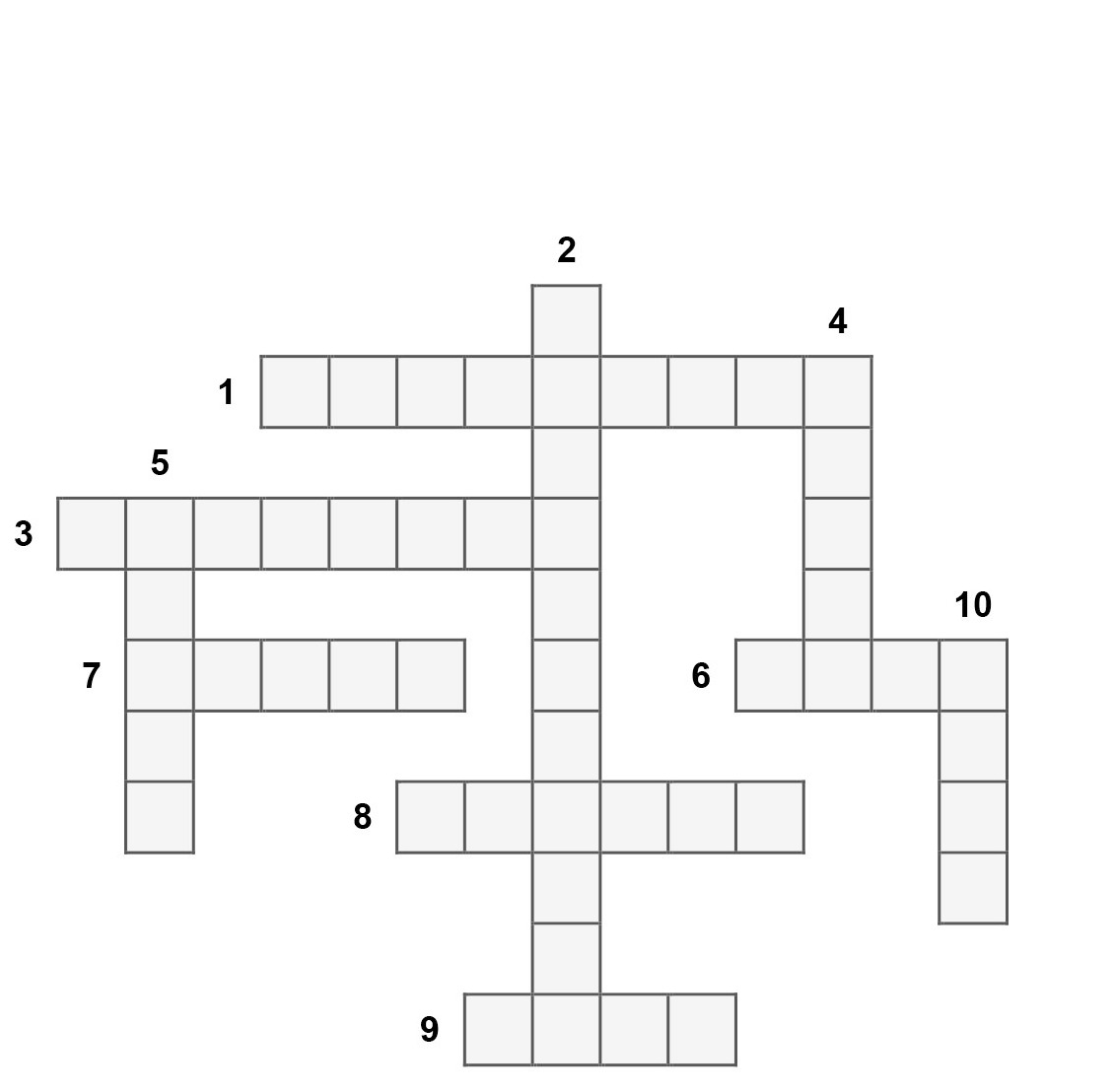
DISCUSSION TASKS
I Say true or false. Correct the false statements.
1. Tommy’s favourite dish was porridge.
2. Tommy preferred cornflakes with milk for breakfast.
3. The boy ate pancakes with plum jam.
4. Mum allowed Tommy to help her in the kitchen.
5. Tom could find a piece of freedom when Granny was in the kitchen.
6. Tommy was glad to learn how to slice vegetables.
7. Tommy was happy to see Lilly in the kitchen.
8. Lilly was quiet and accurate there.
9. Granny turned over a bowl of fish soup.
10. Granny’s tea was a remedy for all diseases.
II Explain why:
1. Tommy really liked to spend time in the kitchen.
2. The boy did his granny’s errands with pleasure.
3. Tom wasn’t glad to see Lilly in the kitchen.
4. Lilly behaved like that in the kitchen.
5. Tommy didn’t want the girl to help him.
TALKING POINTS
I Describe your kitchen.
II Tell about your favourite dish.
III Answer the following questions.
1. What is your least favourite food?
2. Do you like cooking?
3. What do you prefer for breakfast/lunch/dinner?
CHAPTER 4
The Library
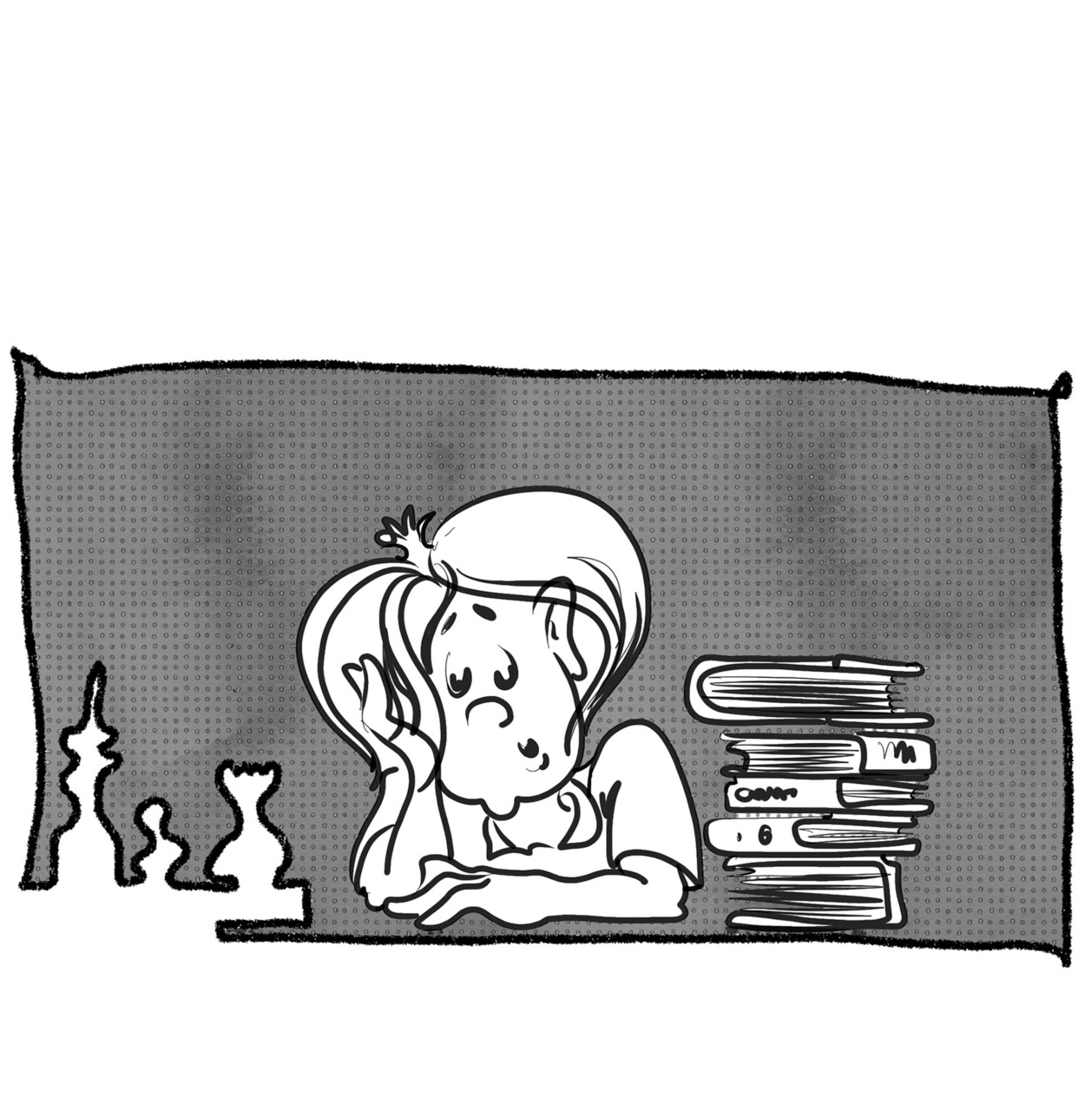
Later he headed for the Library, the place of intellect in the house. The boy thought that his mum was still there, but she had already left.
It was a snug room, panelled in black oak, with large windows and purple curtains. It had a special smell of wood and ink. Fine curled leaves and buds of the carved ornament on the wall were replicated on different subjects in the house — on the family china print, and on the embroidery on the cushions and coverings. That tracery always reminded of the invisible presence of family roots and standards.
There was a very high wooden bookcase, dark of age, full of different dictionaries, thick volumes of directories and books of all genres — adventures, detectives, novels, science fiction, poems, fantasy and fairy tales.
Tommy had a special ritual of choosing a book. He climbed the ladder to get to the upper shelves of the bookcase and slowly ran his fingertip over the many-coloured spines of the books, reading the titles and the names of the books’ authors. The process was really serious for the boy. It took him quite long. Some books attracted him by their uncommon prints, others by bright covers or even by the special paper and printer’s ink smell of the pages. He was able to define if the book was fresh or old only by its smell.
Sometimes the kid chose a book just to look at the pictures. He thoroughly followed each line of a drawing with his observant look and could distinguish grade and grade. Tommy saw the pictures a thousand times and was able to reproduce them in detail even with his eyes closed. They were alive for him.
A lot of incredible stories captured his attention. The boy spent hours, reading in the old rocking chair in front of the fireplace, he was absorbed in the imaginary world of books so deep that forgot about time.
Another object that aroused the child’s interest was ivory chess. The ancient chess box had been on the bureau long before Tommy’s birth. Sometimes he played with his father when he had spare time, although the boy more often played chess with himself. The chessmen came to life in his hands, and the battle on the chessboard was a real intellectual challenge for the kid.
Tommy often climbed to his favourite place on the wide window sill behind the curtains, where he twisted the globe, dreaming about travelling around the world. He imagined trekking through rain forests, observing wild animals of jungles, admiring the ocean from the shore and from his yacht. Inspired by the literature characters, he was longing for adventures. He couldn’t know that inside the house something wonderful was possible and waiting for him.
HELPFUL WORDS AND NOTES
snug room [snʌg] [rum] — уютная
комната
to climb the ladder [klaɪm] [ðə] [lædə] — подниматься, взбираться по лестнице
uncommon print [ʌnkɔmən] [prɪnt] — необычный, редкий шрифт
printer’s ink smell [prɪntəz] [ɪŋk] [smel] — запах книжной печати, типограф. краски
to capture attention [kæpʧə] [əten(t)ʃ(ə)n] — завладеть вниманием, увлечь
rocking chair [rɔkıŋ] [ʧeə] — кресло-
качалка
to be absorbed in smth [əbzɔ bd] —
погружаться, быть поглощённым чем-то
ivory chess [aɪv(ə)rɪ] [ʧes] — шахматы из слоновой кости
chessmen [ʧesmən] — шахматные
фигуры
window sill [wɪndəu] [sɪl] — подоконник
to twist the globe [twɪst] [ðə] [gləub] — вертеть глобус
rain forest [reɪn] [fɔrɪst] — тропический лес
inspired [ɪnspaɪəd] — вдохновлённый
VOCABULARY AND GRAMMAR TASKS
I Find in the text the English equivalents for the following words and word combinations:
Особенный запах дерева и чернил; резной орнамент; воспроизводиться на разных предметах; фамильный фарфор; вышивка на подушках и покрывалах; узор; напоминать о незримом присутствии; родовые корни и устои; тёмный от времени; особый ритуал; корешки книг; определять по запаху; тщательно; улавливать тончайшие оттенки; воспроизвести детально; захватывать внимание; погружаться в воображаемый мир; старинная шахматная коробка; любоваться океаном с берега или яхты; вдохновлённый.
II Match the words that go together.
A to climb 1. attention
B snug 2. chair
C rocking 3. chess
D capture 4. globe
E ivory 5. sill
F twist 6. bookcase
G window 7. print
H rain 8. room
I uncommon 9. ladder
J wooden 10. forest
III Make up sentences of your own using the word combinations from exercise II.
IV Translate the following sentences using the vocabulary of chapter 4. Pay attention to there is/there are construction.
1. Питер поднялся по лестнице и взял старинную коробку шахмат с верхней полки книжного шкафа.
2. В этом доме было потайное место, где мальчик мог погрузиться в воображаемый мир героев книг.
3. Эти герои оживали в его фантазии, и их приключения захватывали воображение ребёнка.
4. Рядом с камином стояло старое кресло-качалка. Том часто сидел в нем, мечтая о походе через тропические леса.
5. В его комнате на подоконнике был большой глобус. Дети вертели его, вдохновлённые рассказом дедушки о кругосветном плавании.
6. На столе отца лежала старинная книга с потрёпанным корешком и необычным шрифтом.
7. В кабинете профессора было много научных книг и журналов. В этом месте в воздухе витал особенный аромат орехового дерева и чернил.
8. На кожаной обложке той книги был удивительный рисунок, потемневший от времени.
9. Этот рисунок напоминал изысканный узор на фамильном фарфоре.
10. На шахматной доске не было нескольких пешек, но остальные фигуры из слоновой кости продолжали сражение.
DISCUSSION TASKS
I Describe the Library in Tommy’s house.
II Answer the following questions.
1. What ritual did Tommy have in the Library?
2. What did some books attract Tommy by?
3. How could the boy define if a book was new or old?
4. What was Tommy’s attitude to the pictures from the books?
5. Did the boy like reading?
6. What else aroused Tommy’s interest in the library?
7. What did Tom imagine when he was twisting the globe?
8. What was the kid longing for?
TALKING POINTS
I Answer the following questions.
1. Do you like reading?
2. What kind of books do you prefer to read? Which genre?
3. What is your favourite work of literature? Who is your favourite author?
4. Where do you usually read?
5. If you were a writer, what would you write about?
II Retell a story that you read some time ago. Describe the main characters. What is the main idea of the story?
CHAPTER 5
The Living room
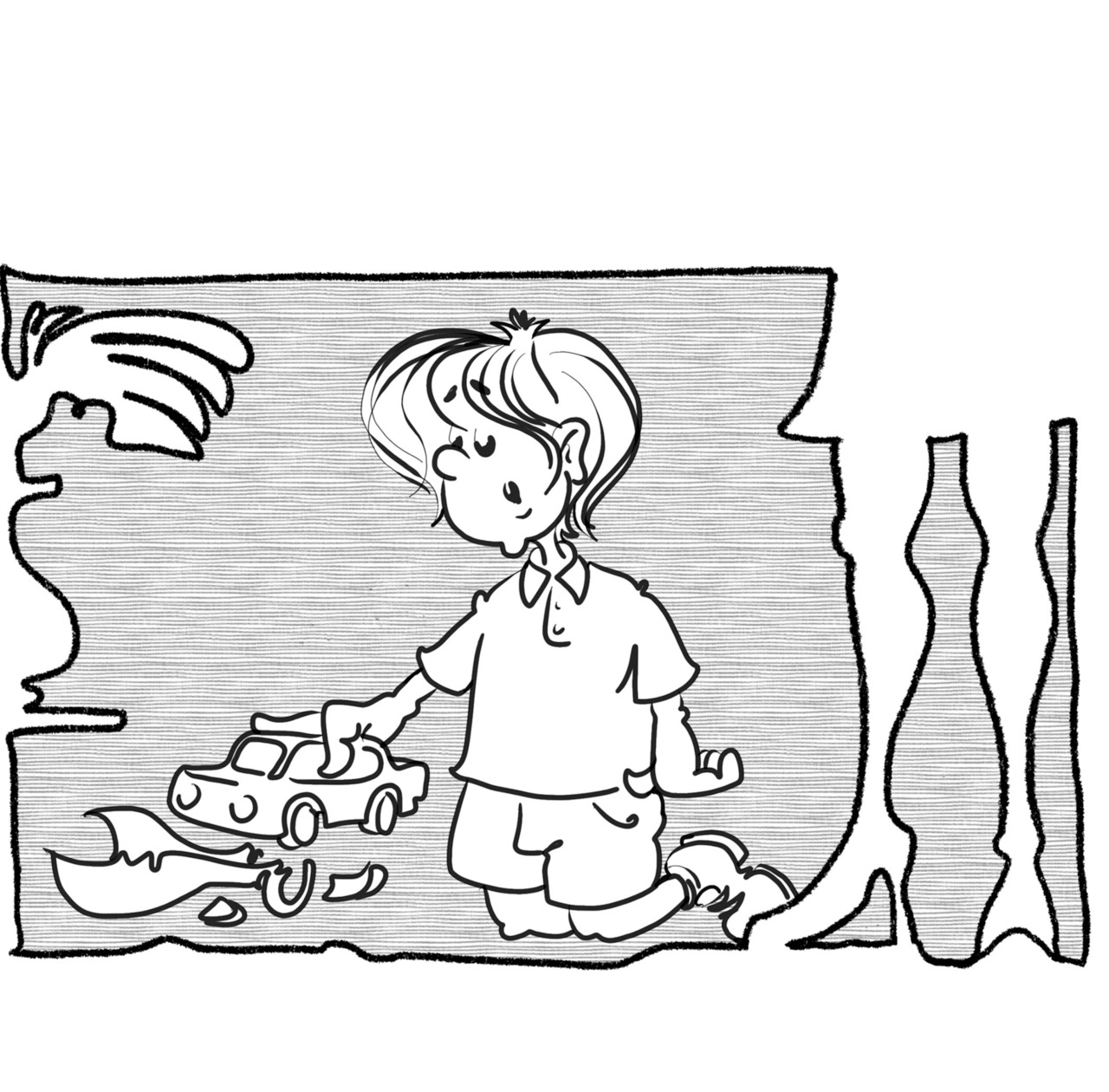
In the spacious and comfortable living room the walls were painted white. The cream curtains looked like real sails, especially when they were waving in the wind blowing through the wide open window. It was the place where the whole family gathered in the evening under the splendid crystal chandelier. The fine glass details of it reminded little pieces of ice, clinking gently from time to time in tune with vibrations of the house. All family members would sit on the leather sofa, sharing some news, or watching and discussing a film. The family atmosphere reigned there.
Tommy was accustomed to order. He usually tried to put everything into its place. He made it a rule after an incident that had happened some time before. The small boy didn’t want to annoy his parents who used to scold him for mess.
One day Tommy broke mother’s favourite Chinese vase. He was playing absorbedly with some toy cars when he accidentally touched the vase. It rocked and fell down, shattered in small sparkling pieces with a loud crash. Tommy was standing still, not breathing in the dead silence, with his eyes full of fear.
Next moment mum, dressed in black silk, ran into the room, Lilly followed her. Saying no word, the boy’s mother looked at the broken vase, then she slowly turned her icy eyes to Tom. She kept staring at him, keeping silent. That reproachful glance followed him everywhere long afterwards. The boy broke eye contact and looked away in embarrassment.
Lilly tried to distract his mum, at the same time she made efforts to advocate and comfort Tommy.
“It isn’t Tommy’s fault, aunt Annie. He hasn’t done it on purpose!
Tom, I’ll help you to collect the fragments, be careful.
I’ll ask my parents to bring you the same beautiful vase!
Mummy is going to give it to you as a present.
Oh, it will be even more gorgeous than the broken one! You’ll see!..”
“Tom, I’m taking your toy cars until you learn how to behave,” his mum said with a calm, cold voice.
Since then Tommy had got his parents’ permission to play only in the game room or on the sports ground.
The boy’s mum and dad quite often discussed his future, appraised prospects of his success, and planned his life several years ahead. Everything was predetermined — his future profession, mode of life, place to live and what people to communicate with. Each step was under control.
“Tommy, have you completed all the Maths tasks? Where is your exercise book?”
“Not yet, mum, I am going to do sums a bit later.”
“Do it right now. And where is your essay?”
“I’ll bring it.”
“Remember that you must study hard.
You are my pride, you will achieve the highest goals.
Will you do it for me, darling?”
“I’ll try…”
“You are the best. You’ll be a great man!
Next year you are going to have more difficult tasks. Are you ready?”
“Yes, I think so.”
“Besides a course of geometry that is starting soon.”
“Ok, now I’d like to draw, mum, I’m going to the game room.”
“Wait, son. We haven’t finished yet.
Don’t waste your time on insignificant matters!
You should be more serious.
I suppose it will be great for you to study Italian, won’t it?”
“I don’t know, mum… May I go to the sports ground?”
“Not yet. You’ll go there later, little boy.
Do you love your mummy?”
“I do, mum.”
“What a good boy!” she said with a sweet voice and gave him a warm glance.
His parents were rather strict, but fair. They wanted for their son the best education, successful career and tried to bring him up as a gentleman. There were a lot of rules for him to follow. Tommy was an obedient child.
HELPFUL WORDS AND NOTES
crystal chandelier [krɪst(ə)l] [_ʃændəlɪə] — хрустальная люстра
to reign [reɪn] — царить, преобладать, править
to be accustomed to smth [əkʌstəmd] — привыкнуть к чему-либо
absorbedly [əbzɔ bɪdlɪ] — увлечённо
loud crash [laud] [kræʃ] — громкий треск
in the dead silence [ɪn] [ðə] [ded] [saɪləns] — в мёртвой тишине
reproachful glance [rɪprəuʧf(ə)l], [-ful] [glɑ n(t)s] — укоризненный взгляд
eye contact [aɪ] [kɔntækt] — зрительный контакт
in embarrassment [ɪn] [ɪmbærəsmənt] — в смущении, растерянно
to make efforts [meɪk] [efəts] — прилагать усилия, стараться
to comfort [kʌmfət] — подбадривать, утешать, успокаивать
to do smth on purpose [du] [ɔn] [pɜ pəs] — делать что-либо нарочно, с целью
permission [pəmɪʃ(ə)n] — разрешение, позволение
to appraise prospects [əpreɪz] [prɔspekts] — оценивать перспективы
predetermined [_pridɪtɜmɪnd] — предопределённый, предрешённый
to do sums [du] [sʌmz] — решать задачи, примеры
to achieve a goal [əʧi v] [ə] [gəul] —
достигать цели
insignificant matters [_ɪnsɪgnɪfɪk(ə)nt] [mætəz] — пустяки
VOCABULARY AND GRAMMAR TASKS
I Here are several words and expressions from the text. (A — J) Match the definition of each of them from the list below (1 — 10).
A reproachful
B to reign
C predetermined
D to comfort
E chandelier
F to achieve a goal
G insignificant matters
H embarrassment
I eye contact
J on purpose
1. a large, decorative hanging light with branches for several light bulbs
2. to make someone feel less unhappy; to console
3. the act of looking directly into one another’s eyes
4. a feeling of self-consciousness, shame, or awkwardness
5. expressing disapproval or disappointment
6. intentionally, deliberately
7. decided by previous events or by people rather than by chance
8. something of little importance or value
9. to reach a desired objective or result by effort, skill, or courage
10. to prevail, predominate
II Replace the italicised words and word combinations with synonyms from the list below in the appropriate form.
to be accustomed to smth; permission; in embarrassment; to reign;
absorbedly; to make efforts; predetermined; to comfort; loud crash; reproachful glance; insignificant matters; on purpose
1. The guy makes no attempt to conceal his indifferent attitude to the critical situation at work. Has he found a new job? I will ask him about his intentions.
2. Alex was used to doing only what his mum wanted. He had no choice, as all his plans and prospects were decided in advance by his parents.
3. The Head of the laboratory says that she is going to give the green light to conduct the experiment and implement the new project.
4. Everybody is sure that when the art director joins the company, a rare genius will rule in this studio.
5. Jane will not even notice you if you enter the room, she is completely involved in drawing.
6. The shy girl blushed in confusion when she read the sincere message of her schoolmate.
7. She knows for sure that her son is not going to waste time on trifles. He promised her to do all his best to become a great scientist.
8. Katty won’t go to the party so late, because she doesn’t want to provoke her father’s negative reaction and catch his disapproving look on herself.
9. If you drop this sculpture here now, a huge bang will wake up the whole house.
10. Her overcritical stare won’t influence my self-evaluation.
11. It’s not a good idea to tell him jokes and entertain now, nothing will console him, until he gets over the critical moment by himself.
12. Betty didn’t believe that her brother could hurt somebody deliberately.
III Complete the sentences using will or be going to in the appropriate form.
1. They _________________ give their son a broad education, so they _______________ hire several tutors to teach him sciences and languages.
2. Andrew _________________ play with his friends in the yard later, he _____________do sums first.
3. Look out! I _________________ collect the fragments of the broken glass.
4. The guy _____________ enter the University, that is why he studies so hard.
5. She __________________ bring the presents tomorrow before our cousin’s birthday party.
6. Your teacher hopes that you __________________ write the essay about modern art in time.
7. “I expect you __________________ tidy the game room up and keep it in order”, Tommy’s mother said in a quiet voice.
8. Robert says that he (not) ________________ listen to his aunt and obey her orders when she visits their house.
9. On Friday the family __________________get together in this light spacious living room around the table under the splendid fine glass chandelier to celebrate granny’s anniversary.
10. “I ________________hide from mum behind the cream curtains! Don’t give me away!” Tommy whispered into Lilly’s ear.
IV Write sentences about your future plans using to be going to or will. Explain your choice.
DISCUSSION TASKS
I Describe the living room in Tommy’s house.
II Answer the following questions.
1. What did the family usually do in the room?
2. Why did Tommy try to keep order in the house?
3. What incident happened in the living room?
4. What was Tommy’s reaction when he broke the vase?
5. What was his mother’s reaction?
6. How did Lilly act in that situation?
7. Why did Tommy’s mum take his toy cars from him?
8. What did the incident with the broken vase lead to?
9. What aspects of Tommy’s life did his parents control?
10. What new subjects was Tommy supposed to take up?
11. Why did his mum want her son to study so hard?
12. Did Tommy have the same intentions?
13. Did the child want to spend much time studying?
14. What would Tommy like to do instead?
15. What was his mother’s attitude to his own interests?
16. Why were Tommy’s parents strict with the boy?
17. Did Tommy follow all his parents’ rules? Why?
18. What was the living room associated with?
III Analyse the following:
1. Lilly’s behaviour in the situation with the broken vase;
How does it characterise the girl?
2. Conversation between Tommy and his mother; How does it characterise the boy, and his mum?
TALKING POINTS
I Tell about the room that you associate with your family place. Describe it.
II Answer the following questions.
1. Is there a tradition in your family? Tell about it.
2. Are you accustomed to keeping order in your room?
3. Do you have to follow a lot of rules at home? What are they?
III Tell about your parents. Are they strict or mild?
CHAPTER 6
The Game room
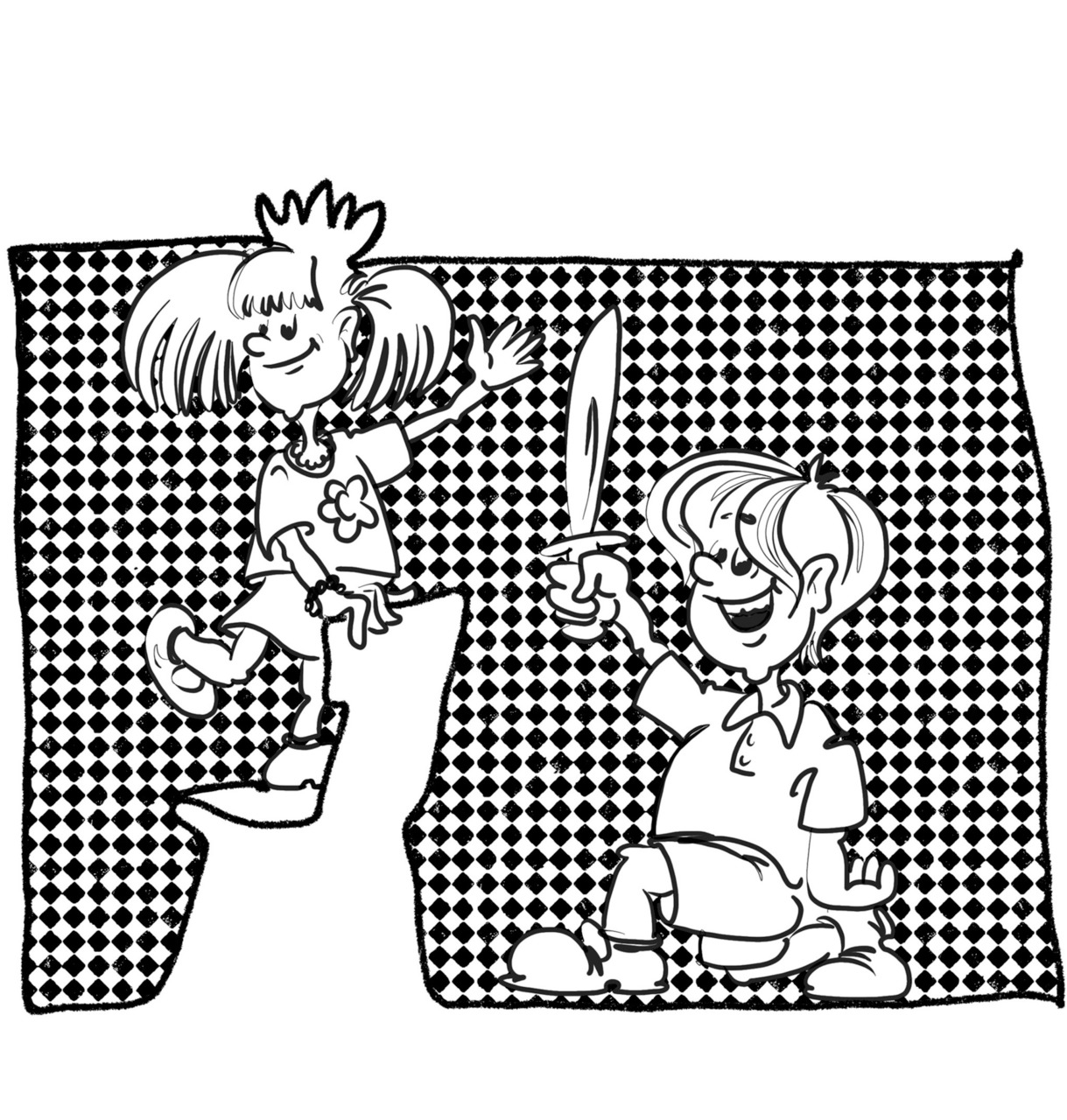
The game room presented a great variety of things for entertainment.
There were some board games, toys, stationery and everything you can imagine for a kid to play. Tin soldiers, small planes, toy cars of different models and colours were on the shelf and on the floor. The railroad on the carpet was an object of the boy’s pride. Playing it, he passed a lot of stations as an engine driver in his fantasy travelling.
Tommy usually put on a record. When he was listening to music, he went on dreaming. The magic sounds aroused in his soul strange unknown feelings, they were unclear to him. He couldn’t explain why one liquid melody evoked melancholy while another beautiful piece of music made him smile.
Tommy really liked drawing. He took his sketchbook, coloured pencils, markers, crayons, then he placed himself on the floоr and started to express his ideas on paper. The child drew everything that came into his head. His fantasy revealed some incredible images, and he often was astonished at his own pictures. They looked as if somebody else depicted the amazing stories.
Lilly visited the room as often as possible. She knew every object in the room in detail. A toy or game, pen or pencil, marker or eraser — the girl could tell a story about any subject.
When Tommy was in a good mood and ready to play with her, she chose costumes for them to play some roles in their home theatre.
“Tommy, I will be a Princess and you’ll play a pirate.. no, you’ll be a hero who will save me! …or you’ll free me from an evil wizard’s castle! Here is my sparkling gown! Where is your prince’s suit?”
“Lill, we have already played this game. Let’s make another one for a change! Maybe lotto? Or the sea battle?”
“It is very complicated and boring for me. Tommy, please!”
“Oh, my building kit is here, I haven’t finished construction of the airport yet. Will you help me?”
“I don’t know… I can only help with decoration… Do you want your airport to be luxurious?”
“What?! Are you kidding? Lilly, this is the airport! Have you ever seen a luxurious airport?”
“Why not create it right now?”
“No. I’ll build the best airport myself, without your silly decoration.”
“You won’t! And it’s not silly!
What makes you think that your airport will be the best?!”
“I know for sure, because I’m the best constructor!”
“Ahahaha! Who said it?”
“My mum! She says that I’m the best! Don’t dare to laugh! And don’t speak to me like that.”
“Ok. Tommy, will we play today?”
“Lill, let’s make your theatre performance.
Put on your dress, and I will find my sword.”
“And fetch my crown, please!”
“Have you ever seen anybody hidden in the wizard’s castle as a prisoner, still wearing a crown?!”
“You are too down-to-earth!
Have you ever seen a princess without a golden or at least silver crown?!!”
“Wear whatever you want, Lill!”
“Hurry up! I’ve already dressed up!”
“I’m not going to save you without my sword! Wait a minute!”
Ten minutes later they prepared decorations made of chairs, blankets, and some stuff from the room, and started their play. It was quite exciting.
Tommy was surprised with Lilly’s creativity and her ability to invent new scenarios. She was free to express her feelings.
HELPFUL WORDS AND NOTES
entertainment [_entəteɪnmənt] — развлечение, веселье
stationery [steɪʃ(ə)n(ə)rɪ] — канцелярские принадлежности
liquid melody [lɪkwɪd] [melədɪ] — плавная мелодия
to evoke [ɪvəuk] — пробуждать, вызывать
sketchbook [skeʧbuk] — альбом для
рисования
crayons [kreɪɔnz] — цветные карандаши, мелки
to reveal [rɪvi_l] — открывать, показывать, обнаруживать
to be astonished at smth [əstɔnɪʃt] — поражаться, крайне удивляться чему-либо
to depict [dɪpɪkt] — изображать, рисовать, описывать
evil wizard’s castle [i_v(ə)l] [wɪzədz] [kɑ_sl] — замок злого волшебника, колдуна
sparkling gown [spɑ_klɪŋ] [gaun] — блестящее платье
building kit [bɪldɪŋ] [kɪt] — конструктор
luxurious [lʌgʒu(ə)rɪəs] — роскошный
sword [sɔ d] — меч, шпага
to fetch [feʧ] — принести, сходить за чем-либо
down-to-earth [_dauntuɜθ] — приземлённый, практичный
VOCABULARY AND GRAMMAR TASKS
I Here are several expressions from the text. Give Russian equivalents to them.
An object of one’s pride; to arouse some feelings; to make somebody smile/cry; to place oneself; to express somebody’s ideas, feelings; to come into one’s head; to be astonished at something; to know something in detail; to be in a good/bad mood; dare (not) do something.
II Make up sentences of your own with the expressions from exercise I.
III Complete the crossword puzzle.
Across
1. Paper, envelopes, and other materials or equipment used for writing. (noun)
4. A pad or book of drawing paper for sketching on. (noun)
6. A dress, usually a long one, which women wear on formal occasions. (noun)
7. The action of providing or being provided with amusement or enjoyment. (noun)
10. A pencil or stick of coloured chalk or wax, used for drawing. (noun)
Down
2. To bring or recall (a feeling, memory, or image) to the conscious mind. (verb)
3. To cause or allow (something) to be seen. (verb)
5. Extremely comfortable or elegant, especially when involving great expense. (adj)
8. To go for and then bring back (someone or something) for someone. (verb)
9. A weapon with a handle and a long sharp blade. (noun)
11. A man who has magical power, especially in legends and fairy tales. (noun)
12. To show or represent by a drawing, painting, or other art form. (verb)
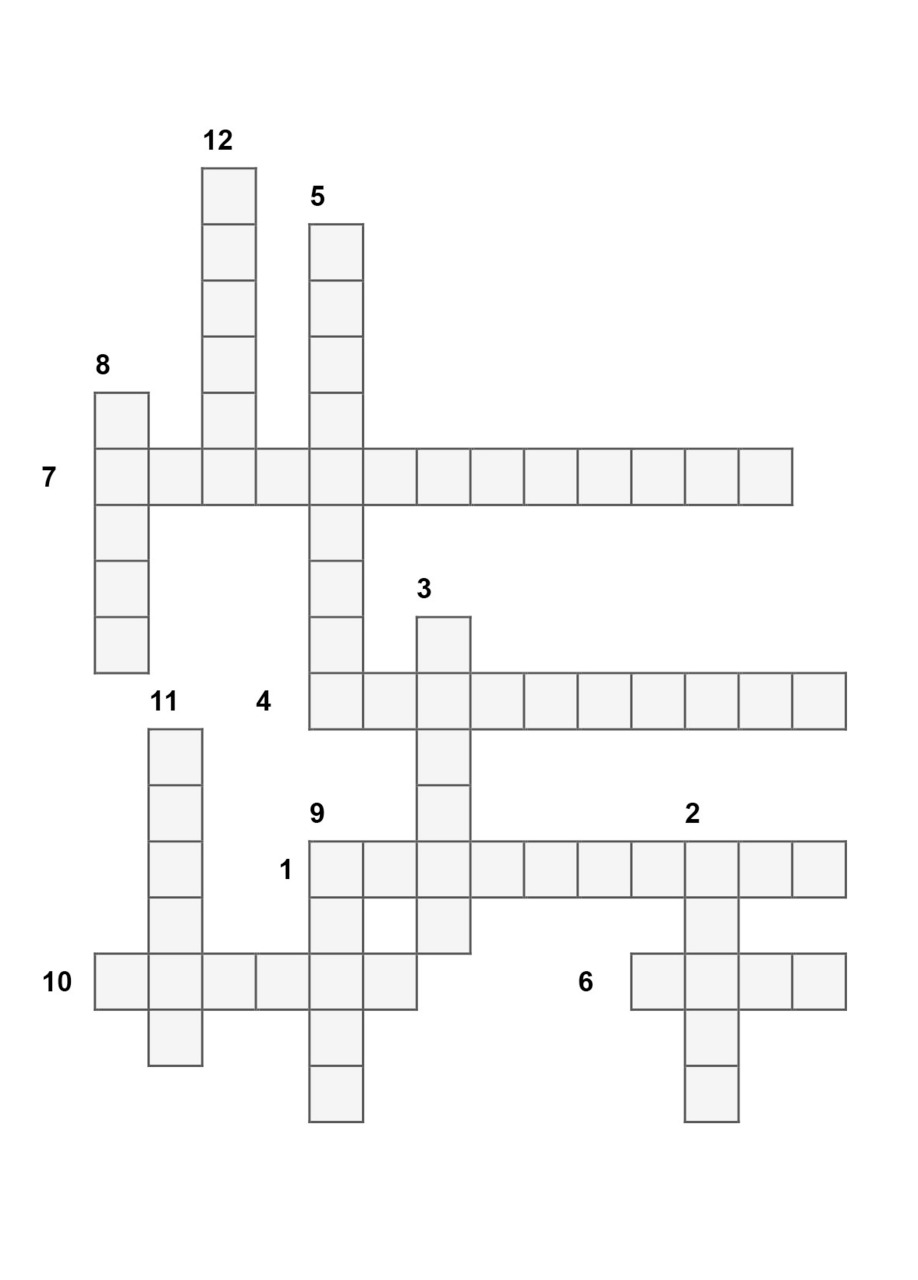
IV Translate the sentences paying attention to Present Perfect Tense.
1. Дети уже удобно устроились на полу в игровой, они ждут начала их любимого мультфильма.
2. Дэвид еще не играл со своими друзьями в прятки в этом просторном доме. Здесь полно потайных мест, где его будет трудно найти.
3. Люси никогда раньше не слышала такой красивой плавной мелодии, которая пробуждает неуловимое чувство грусти в её юной душе.
4. Ты когда-нибудь играл в детском домашнем спектакле? Присоединяйся к нам! Мы уже распределили роли, но у нас есть для тебя что-то особенное!
5. Кевин уже нарисовал целый зоопарк, а его родители всё ещё разговаривают с учителем о его поведении в классе.
6. Лилли ещё не выбрала маскарадный костюм, который она наденет на новогодний бал.
7. Она только что дала этому юному художнику задание изобразить улицу, на которой он живёт. Он уже нарисовал здание театра, который находится недалеко от его дома.
8. “Ты уже нашёл вещи для декораций нашего шоу?” — спросила его младшая сестра. “Ещё нет. Но я уже приготовил чудесные костюмы.”
9. — Тебе когда-нибудь говорили родители, что ты лучший во всём? — Мама недавно сказала, что я непременно достигну самых высоких целей в жизни.
10. Томми дважды заходил в игровую этим утром, но не увидел там новый конструктор, который вчера вечером принесли родители.
DISCUSSION TASKS
I Say true or false. Correct the false statements.
1. There were a lot of different toys in Tommy’s game room.
2. A toy plane was an object of his pride.
3. When Tommy put on a record, he started dancing.
4. The boy really liked to express his ideas on paper.
5. He drew only some incredible images.
6. Tommy was often astonished at his cousin’s pictures.
7. When Lilly visited the house, they often played in their home theatre.
8. Lilly decided to play a princess in their performance.
9. Tommy was supposed to be a pirate in the game.
10. Lilly helped him to build a luxurious toy airport.
11. Lilly believed that Tommy was the best constructor.
12. Tommy was surprised with Lilly’s creativity.
13. Tommy was free to express his feelings.
II Act out a dialog between Tommy and Lilly.
III Complete the following sentences.
1. When Tommy was listening to music, _______________
2. He couldn’t explain why _______________
3. Tommy took his sketchbook, coloured pencils, markers, crayons, _______________
4. The boy’s pictures looked as if _______________
5. When Tommy was in a good mood, _______________
6. Tommy was sure that he was the best constructor, because _______________
7. The children built decorations of _______________
8. Tommy was surprised with _______________
TALKING POINTS
I Answer the following questions.
1. What toys and games do you have in your room?
2. Which toy is your favourite one?
3. Which game do you like to play?
4. Who do you usually play with?
5. Have you ever acted in a play or taken part in a concert? (at school, at a children’s holiday, etc.) Tell about it.
6. What role would you like to play in a performance? Why?
7. Do you like listening to music? What kind of music do you prefer?
8. Do you like drawing? What would you like to draw? What would you prefer to use to make your picture? Pencils, watercolours, gouache?
II Give your opinion on the following:
1. What kind of person do you consider to be creative? Give an example. Explain your choice.
2. Is it possible to develop a talent? If yes, tell what a person should do to cultivate it.
III Tell about a person who, in your opinion, is free to express his/her feelings. Describe the person’s behaviour.
CHAPTER 7
The Sports ground
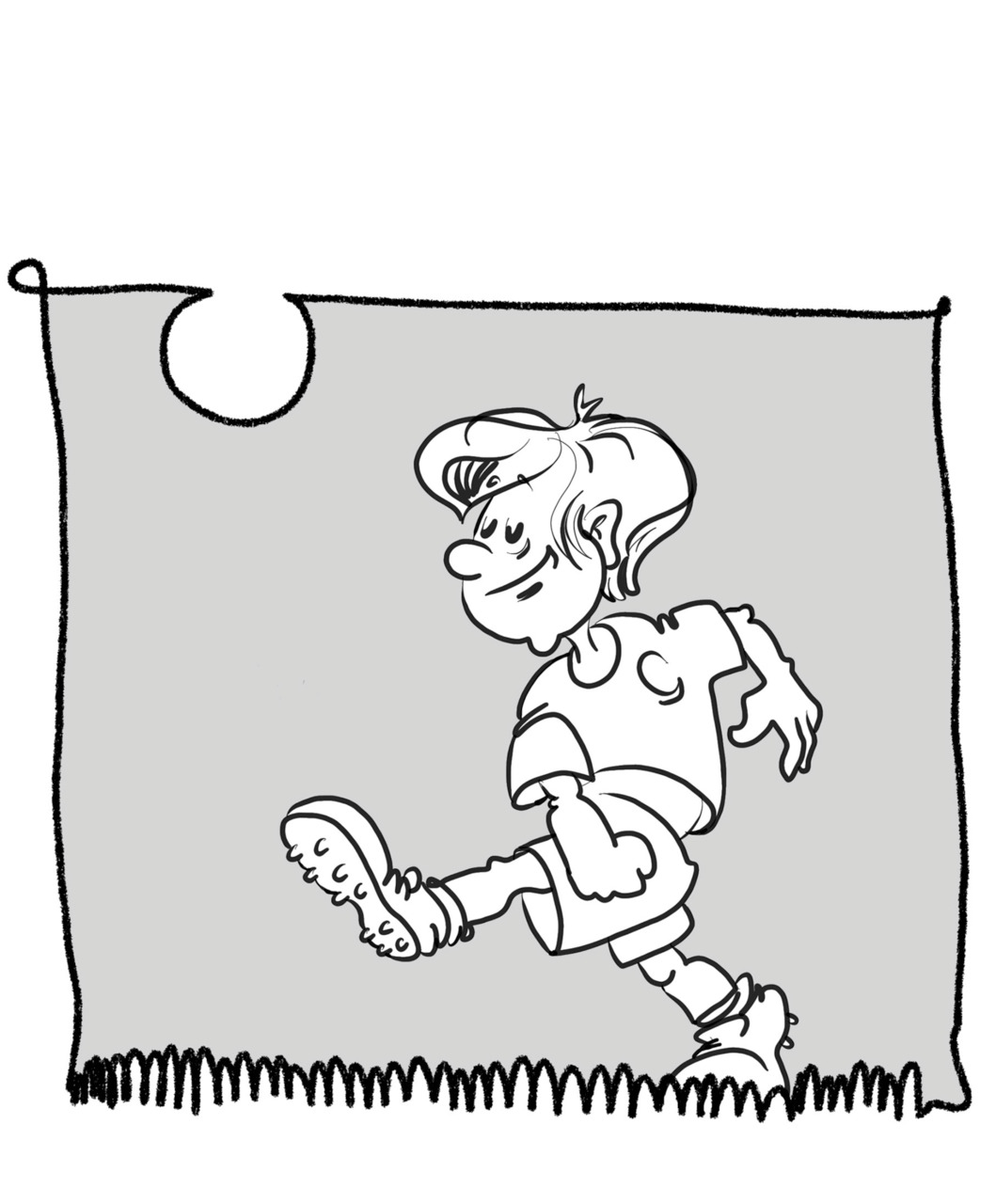
Almost every day Tommy went to the sports ground.
It was situated behind the house. Tommy loved to run, jump and play with a ball. There was a basketball hoop, the boy tried to jump up higher and higher to throw the ball right into it.
He also trained his football skills hard. The kid tried to take every chance to play football with his father. Tommy was well-developed physically — he had a good reaction, so he moved very quickly with ease. The boy played so recklessly and felt confident with the ball.
He also played tennis with dad. Unfortunately, playing together wasn’t their regular practice, as Tommy’s dad rarely had free time. Nevertheless, the boy’s father wanted to improve his son’s tennis skills. He followed each movement of Tom carefully. He gave his comments and short instructions in a commanding tone:
“Faster! Move! Right! Again!”
“Daddy, I’m a bit tired.”
“Tommy, you’re a good tennis player, you can become the world champion if you train harder.”
“Can we continue later? Frankly speaking, I like playing football more.”
“You have more chances in tennis. We must improve your skills.”
“But we play so seldom…
Dad, will we go to the football match in august? Mum said if I do all my Maths, I’ll be able to go!”
“We’ll see, boy.
If I don’t have to leave for Strasbourg on a business trip, we’ll surely watch the match!
Come on, Tom, move faster!”
Suddenly, making an awkward movement, Tommy twisted his ankle and fell on the ground with a short cry, touching his leg.
“Dad, it seems to me, I have just stretched my ankle…”
“Oh, are you kidding?! Come on, boy, get up!
You are a man, you should be strong and calm in any situation.
Control yourself!”
“It hurts…”
“Then let’s go to the doctor.”
HELPFUL WORDS AND NOTES
basketball hoop [bɑskɪtbɔl] [hu p] — баскетбольная корзина, кольцо
well-developed physically [wel-dɪveləpt] [fɪzɪk(ə)lɪ] — физически развит
to move with ease [mu v] [wɪð] [i z] — двигаться с лёгкостью, непринуждённо
to play recklessly [pleɪ] [rekləslı] —
двигаться с лёгкостью, непринуждённо
nevertheless [_nevəðəles] — тем не менее, однако, всё-таки
in a commanding tone [ɪn] [ə] [kəmɑ_ndin] [təun] — командным, приказным тоном
frankly speaking [fræŋklɪ] [spi_kɪŋ] — честно говоря
awkward movement [ɔkwəd] [mu vmənt] — неловкое движение
to twist one’s ankle [twɪst] [æŋkl] — вывихнуть лодыжку, подвернуть ногу
to stretch one’s leg [streʧ] [leg] — растянуть ногу
VOCABULARY AND GRAMMAR TASKS
I Find in the text the antonyms for the following words:
Lower; feeble; slowly; discreetly; uncertain; occasional; to deteriorate; heedlessly; more sluggish; easier; dishonestly; skillful; weak; wild.
II Here are several expressions from the text (A — I). Match the definition of each of them from the list below (1 — 9).
A to control yourself
B regular practice
C to take chance
D to move with ease
E frankly speaking
F to give instructions
G to play recklessly
H in a commanding tone
I an awkward movement
1. a settled tendency
2. to tell what should be done
3. in an imperious manner of speaking
4. to act rashly, headlong, hastily
5. to take an opportunity
6. an uncomfortable or clumsy motion
7. to utter in an open, direct, honest manner
8. to stir without difficulty or effort
9. to make yourself behave calmly even though you are feeling angry, excited, or upset.
III Make up sentences of your own with the expressions from exercise II.
IV Complete the sentences with modal verbs in the appropriate form.
Бесплатный фрагмент закончился.
Купите книгу, чтобы продолжить чтение.
